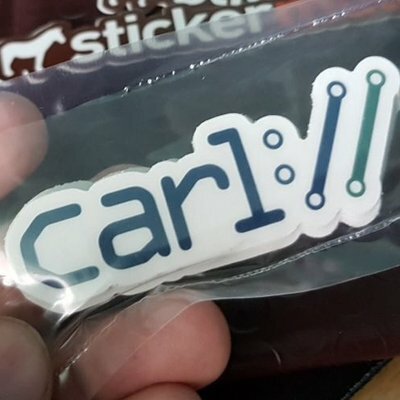side note i like the use of calvin over that other guy
yeah fuck crowder
don’t fuck him tho
deleted by creator
Crowder’s one of my favorite musicians… Oh wait, different Crowder.
Music Crowders’s good. Who’s this other Crowder?
The louder one.
Wdym? I legit don’t know (I’m not exactly up-to-date with the current (presumably american) news)
Steven Crowder, the assshole from Louder with Crowder. If you don’t know about him you’re lucky.
That Covfefe got cold a long time ago.
Not a hot take at all. Asking someone to go from a GUI heavy operating system to a command line heavy one and be just as productive is lunacy. Like all major changes it is important to ween off the old thing.
My biggest hurdle with the switch has been permission related issues, and you can’t deal with those cleanly with a UI, and every help thread under the sun throws out a bunch of command line commands giving a solution without explaining why those changes are needed. It may seem like Unix 101 to experienced Linux users, but it is really cryptic to newcomers coming from operating systems that are…cough more lenient with their permissions.
There is also a mentality that UIs are much more idiot proof than command line. UIs are written by people who actually know the OS so we can’t accidentally delete our home folder because of a typo. It is a very legitimate concern.
Yesterday morning i installed Mint xfce on an old laptop.
I wanted to install synaptics drivers for the touchpad because i use the trackball as mouse but need the touchpad for clicking. Something that isnt configureable in the default driver.
When i copied an example config file and added my line, i rebooted the computer.
The GUI broke because in the example config file, there were “…” To indicate writing further options, but xorg couldnt interpret or ignore it, so i had to figure out how to edit textfiles in the command line.
No fun times, and definetely a risk for new users.
This story is literally every experienced Linux users first horror story.
I still remember the first time I broke my xorg config on my shiny new slackware 10 install in early 2005.
It’s so common there’s an XKCD about it.
Not really, the vaaaast majority of PC users don’t need the linux commandline.
i love K⭐D⭐E
KDE FTW!
Arguably you can’t beat Debian + KDE
Aktually, I prefer Arch + KDE. I say if you like your current desktop, then stay with it. I’ve hit the sweet spot with what I’ve got because I love the AUR, pacman, and paru.
Arch btw
Just became a first time user (~48 hours ago) of KDE on Sparky distro and I’m pretty impressed.
Great take. But you know the real sneaky one that trips you up? File system.
I wouldn’t call myself a beginner, but every time I install a Linux system seriously I see those filesystem choices and have to dig through volumes of turbo-nerd debates on super fine intricacies between them, usually debating their merits in super high-risk critical contexts.
I still don’t come away with knowing which one will be best for me long-term in a practical sense.
As well as tons of “It ruined my whole system” or “Wrote my SSD to death” FUD that is usually outdated but nevertheless persists.
Honestly nowadays I just happily throw BTRFS on there because it’s included on the install and allows snapshots and rollbacks. EZPZ.
For everything else, EXT4, and for OS-shared storage, NTFS.
But it took AGES to arrive to this conclusion. Beginners will have their heads spun at this choice, guaranteed. It’s frustrating.
I did NTFS because both windows and Linux can read it. Do I know literally any other fact about formatting systems? Nope. I’m pretty sure I don’t need to, I’m normie-adjacent. I just want my system to work so I can use the internet, play games, and do word processing.
Ext4 is the safe bet for a beginner. The real question is with or without LVM. Generally I would say with but that abstraction layer between the filesystem and disk can really be confusing if you’ve never dealt with it before. A total beginner should probably go ext4 without LVM and then play around in a VM with the various options to become informed enough to do something less vanilla.
and then play around in a VM with the various options to become informed enough to do something less vanilla.
This part is skippable, right? Any reason a user should ever care about this?
(note: never heard of LVM before this thread)
It makes adding space easier down the road, either by linking disks or if you clone your root drive to a larger drive, which tends to not be something most “end users” (I try not to use that description but you said it heh) would do. Yes, using LVM is optional.
New Linux Users don’t even know the difference.
Ha! Yeah, I remember that phase. I was planning to install LXDE as my first distro, simply because I thought the wallpaper looked cool.
Yeah hi that’s me - I just use pop_os and everything works so I just roll with it
PopOS is great! I have used a few other (but never strayed far from APT), and I also did some light reading when doing my final decision . PopOS was the best fit for and easy-to-use OS without Snaps. Linux is great and all with how much control you have, but I want as little maintenance as possible for my daily driver.
Just installed Mint to try it out because it looks similar to Windows. Don’t judge me.
Oh I’ve judged you! And I find you guilty of making an acceptable decision that suites your preferences.
Literally the only reason I use Zorin is because I am too computer illiterate to put the stuff i like about its desktop environment in a more lightweight distro or on Qubes
And for new users choosing a distro with big user base (thus having a better support system) should be a top priority. Instead newbies are often advised to use an obscure distro that in theory might be a good fit, but isn’t. Probably those who do the recommendations are Linux testers (using VZ) rather than Linux users and mostly evaluate a distro based on install process and out of the box usage.
Configuring a big distro to your needs is much better than choosing a nishe distro.
It’s like learning how to interact with Lemmy, and then deciding which app you want to use to interact with it.
Voyager for the win!
I’m a noob using the default Ubuntu DE for a few months now and I’ve gotten used to it, at this point I’m afraid to ask what are the other DEs and whether I should swap over
Don’t. It’s a trap. Most of them have compatibility issues with software. Stock Ubuntu is the benchmark for every piece of software these days. Deviating is fun until it isn’t.
Unless you want to go a non Debian based distro, always pick Ubuntu.
Stock Ubuntu is the benchmark […]
…for nothing this days. The only people using Ubuntu now are dinosaurs and system managers running cheap servers or locked into Canonical’s ecosystem, and the latter are using headless servers, remotely managed, not the DE. Variety is the spice of life. All mainstream DEs are perfectly serviceable, 100% compatible with everything and completely stable and reliable. FFS, Ubuntu’s snaps don’t even work well on their own DE. Stop fearmongering for Canonical, let people live life.
There’s Two Main Choices:
Packages…
- Pacman-based - Arch, Arco, Endeavour
- RPM-based - Fedora, SuSE
- Aptitude-based - Ubuntu, Debian
Choose Pacman for rolling release, bleeding edge. Pick aptitude for servers and pick RPM if you want something that ‘just works’.
Desktop…
- Full DE - Gnome, KDE
- Window Manager - Awesome, i3
High end machines with lots of fancy features and ease of use pick a full DE. WM is good for speed and low-end hardware but harder to use.
So for gaming… Pacman? I thought mint and kubuntu use aptitude, and was under the impression those are two of the better gaming distros.
I hate windows, but am sick of trying Linux every 5-6 years and finding out that I cannot get half the games I play to work. Admittedly, with you guys I might not be going it alone this time…
Debian-based systems (including Ubuntu and its forks such as Mint) uses dpkg and APT (APT does all the communicating with repositories, dependency managment etc, dpkg actually installs and removes packages.) Aptitude is a TUI front-end for APT that gives you a menu-based system in the terminal. Synaptic (not to be confused with the trackpad driver) is a GUI front-end for APT.
I game on Linux Mint. Now it might be my tendency to play single player and/or cooperative multiplayer (think Stardew Valley or Unrailed!) games often made by smaller studios and indie developers as most of the AAA space has otherwise offended me, but…I don’t really have a problem. The vast majority of things just install and run from Steam.
Disagree on picking RPM distros for an absolute beginner (this is what the image is about at least). SUSE maybe but you don’t want a newbie having to deal with US patent bullshit and especially SELinux. Similarly, no newbie will ever pic a barebones WM as a first time user.
I started on CentOS and don’t remember any issues but that was a long time ago. I flirted with Suse, Ubuntu, and Arch when RH started being a super dick. I finally settled on Rocky, rpm is the devil I know.
For windows users that go to Linux I always recommend KDE as it looks like windows and it’s easy for them to understand and use it!
Start recommending Cinnamon then, it’s the best DE when switching from Windows.
Whats better in cinnamon in your opinion?
It’s really similar to Windows in how you use it. Switching between Windows 11 and Cinnamon is as seamless as it can be.
There’s almost no configuration or anything necessary, you just install it and it’s great.
As a power user of windows I’ve lost faith in Ubuntu, though. Their DNS implementation alone is a disaster. So I’ve switched to Debian and KDE, but then I saw there is a Mint Debian Edition (LMDE) so that’s probably what I would recommend if anyone asked me. I personally haven’t used it yet tho as I’m enjoying KDE.
Cinnamon is not the Ubuntu DE, it’s Linux Mint’s.
Linux Mint is based on Ubuntu
#You are perfectly right.
All major distributions offer all major Environments. I currently use either Debian or Ubuntu and usually install by booting the Netinstall.iso right from the official Servers which installs just the base system without any GUI at all. Then I use tasksel to select the environment. Ok, not every Environment is part of Tasksel but often it is just adding another Repository and running another apt install operation.
And yes, on my experimental computer I often install a dozen environments just because I can. Selectable at Login-Screen.
But now somethings VERY important from someone with 35 years of POSIX experience:
If you are a newby FOR GODS SAKE USE UBUNTU.
And if you are a pro… Ubuntu still is a very good option. Only if your have VERY GOOD REASONS which you COMPLETELY UNDERSTAND, only then use something else. Which is Debian for me.
I use Arch because not only am I into self abuse, I also enjoy being publicly flogged whenever I ask for help, which is never, because anytime I have a problem with it, there’s a pretty good chance someone else has asked before me.
If you are a newby FOR GODS SAKE USE UBUNTU.
As someone who only a couple of years ago made the jump to linux. I’d also recommend PopOS super easy to start with.
PopOS is a sure way of getting into ten times more problems than Ubuntu.
Seriously, I know them all. Started with NetBSD in 1991, used pretty much everything.
If your system isn’t super weird then Ubuntu is the most relaxed experience you will ever have as a newby.
(And yes, I am not using Ubuntu currently. But then, I hat 35 years of POSIX/Unix/Linux experience)
How?
I actually had more issues with Ubuntu than popos. And the one audio issue I had, the system76 guys were fantastic.
Ubuntu is filled with bloat these days, and your actually better off with straight Debian than Ubuntu. Not to mention as a whole Ubuntu has made some ‘questionable’ decisions in recent times
Until you use software that without up front notice Ubuntu decides to move from APT to Snap without a migration process in place for your settings or credentials. Like has happened with Telegram and with Chromium. And then stuff breaks in ways where you as a noobie would have no idea how to fix.
This is exactly what happened with the Ubuntu setup on my parents’ laptop and I’ve since moved everything over to Linux Mint for them so they don’t have to deal with that anymore.
If you are a newby FOR GODS SAKE USE UBUNTU.
As an IT professional, I use Ubuntu LTS only because I don’t want to spend my time tinkering around with the OS itself.
Basically, it’s this comic:

All my hare-brained development ideas are more or less sandboxed in Docker containers. Rarely I need to schlep out to Sourceforge to get the right app for something. Most of the time there’s an apt or flatpack thing for what I’m up to, but I do go on a spree purging all that from time to time.
My only complaint is with Nvidia driver support/quality/maintenance, but I get that’s not Canonical’s fault.






















